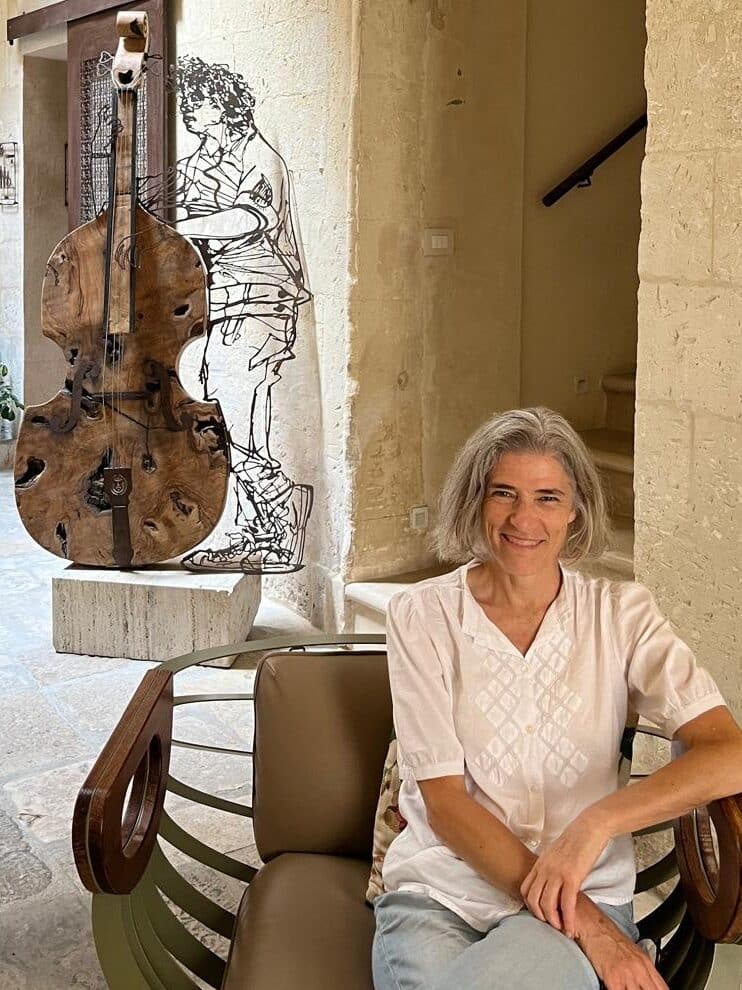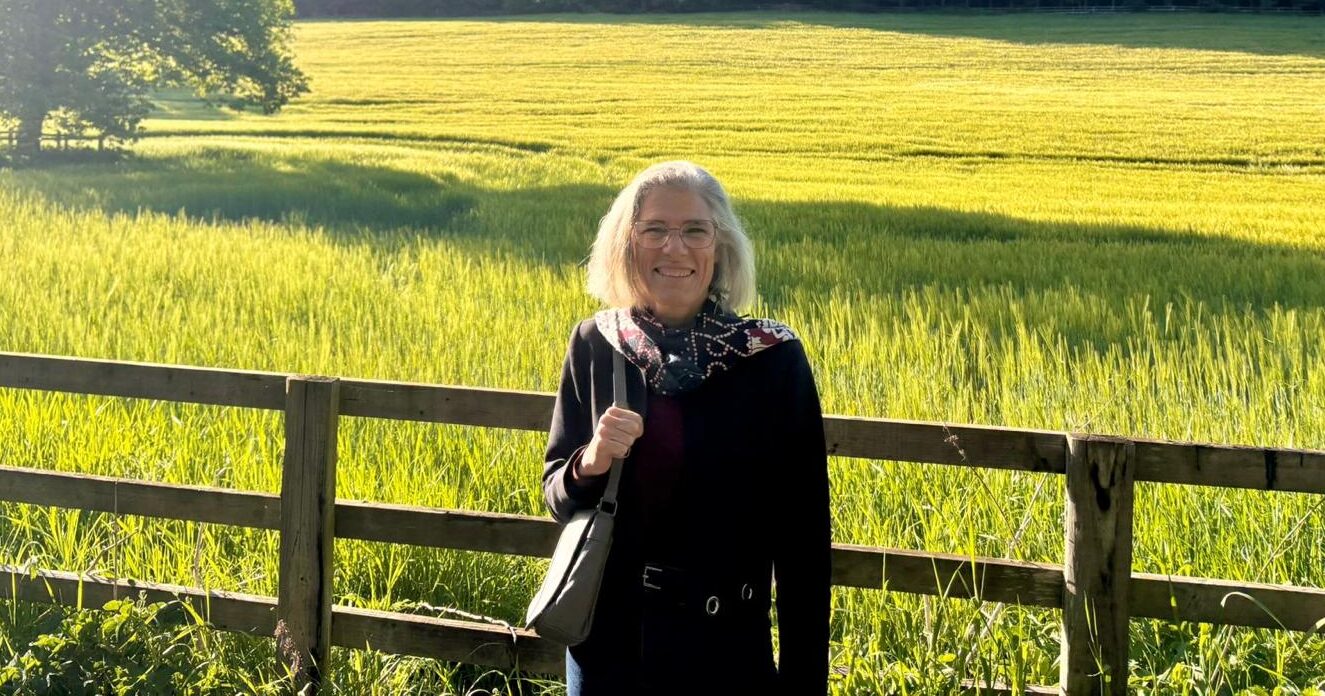As she comes to the end of an incredible 7 years as a member of our Board of Trustees, we caught up with Anna Segall – a former humanitarian lawyer, charity Chief Executive and one-time child gymnast – for a chat.
Speaking with Anna on a video call from her home in Paris, we found out what she’s learned during her time on the board, where her passion for her work comes from, and the message she has for our supporters.
Can you tell us a bit about your life and career before you joined the board?
I’m Australian by origin, but I’ve always been very interested in living abroad – probably partly because my grandparents were refugees from Germany in 1937. I worked as a commercial lawyer initially, then I started the first job I was really passionate about, which was manager of the Australian Red Cross International Humanitarian Law programme.
After that I moved to the International Committee of the Red Cross in Geneva, working with National Red Cross and Red Crescent societies around the world. Then I moved to work with the UN Agency for Palestine Refugees based in Jerusalem. I worked with them as Director of International Law for a while, and then Director of Legal Affairs for the whole organisation.
In 2014, I came to Paris, which is my favourite city and where I live now, and I worked with UNESCO for about four years. Then I was Chief Executive at the World Association of Girl Guides and Girl Scouts, and I left that role last year.
How did you first hear about Hope and Homes for Children?
I saw the board role with Hope and Homes for Children advertised, and it immediately appealed to me. The notion that children need to have a home and a family just spoke very strongly to me, probably partly because of the refugee background in my family and the fact that lives can go in so many directions, both for children and for their parents.
My sister-in-law is a child psychologist, and I had a chat with her just to see “what’s your take on orphanages?”, “what’s your take on institutional care?” and she was very supportive of the organisation and the work that Hope and Homes for Children does. So, I put in an application and was selected, and I’ve had a lovely time working with an organisation that does really important and big picture strategic work and makes a difference in the lives of children around the world.
What’s a key message you’d like the public to know about our work?
One of the things that’s really interesting, that I didn’t know before working with Hope and Homes for Children, is that 80% of children in orphanages around the world are not actually orphans. People think that they’re doing good when they support orphanages and don’t realise that quite a lot of the kids in orphanages are not, in fact, orphans, that they have families they could be living with.
The other thing that I think is really important for people to know is the harm institutions do to children. Children do much better when they’re brought up in loving families than when they’re brought up in institutions – however good the institution is. So, I think it’s really important for people to know how important it is to find ways to support families to look after their children at home.
And can you tell us some of your proudest achievements during your time on our board?
I think there are three areas that I’ve been super proud of. One is the really concrete skills that we bring to the deinstitutionalisation space, and the fact that Hope and Homes for Children can provide expert support in getting countries to transition away from institutional care.
I was also proud of the rapid response in the Ukraine conflict, that Hope and Homes for Children expanded its operation tremendously, dealing not only with the immediate situation of children during the conflict, but also the general situation of institutionalisation in the Ukraine.
Another thing I’m really proud about is that Hope and Homes for Children has been really influential in bringing the cause of deinstitutionalisation onto the domestic, national and international agenda.
What are some of the biggest challenges the organisation faces going forward?
The challenge the development and humanitarian sector is facing generally is that we’re not in a very generous period in world history. The development agenda has slipped in the focus of governments, and this creates real problems for organisations like Hope and Homes for Children.
And there’s an associated element that I think is really dangerous for society generally. It’s the diminution of space for civil society. In some ways, it’s harder to talk about human rights and the importance of human rights than it was some years back.
It’s really important that Hope and Homes for Children and other civil society organisations continue to push the need for respect for human rights and the place of civil society and the voice of civil society.
I think there’s a real risk that the environment we’re currently in will undermine the protection agenda for children and others who need protection services.
Where does your passion for your work come from?
Even when I was a kid, I had firm ideas about fairness and justice and equality and treating people well. I think the fact that my grandparents and father were refugees also brought home to me in a very personal way the notion that people need to have chances.
People need to look out for each other. People need to be respectful towards each other. And that all links to the sorts of work I’ve done – in human rights, humanitarian law, refugee rights, rights of children, rights of women, equality. So, I think it’s both part of my character and part of my family background.

What do you like to do outside of work?
I’m very busy with a whole lot of sporting stuff and a whole lot of cultural stuff. And then a lot of time spent with friends. I do a lot of yoga and cycling and swimming. And as they say in Australia, bushwalking.
And then Paris is absolutely brilliant for culture, so I spend a lot of time going to jazz bars and cinemas; and the museum and gallery scene is great. Because I’ve lived and worked in lots of different places, I know lots of people scattered all around the world – so I’m always encouraging them to come and visit me in Paris or catching up with them elsewhere.
Who are your personal role models / heroes?
One of them is Nelson Mandela. He remained gracious, filled with a desire to make change for the future and not be vengeful in relation to the past. That is something I really admire.
The Olympics were in Paris last year, and as a child I used to do gymnastics. I went to one of the outdoor “fan zones” and watched Simone Biles. She epitomises for me a lot of similar characteristics: that courage, seeing the positive, taking time for herself when she needed to take time for herself, and then stepping back in and stepping back up at a time when a lot of people would have thought that she would be too old to be performing gymnastics internationally. She was absolutely spectacular and just also a gracious, light-filled person.
And finally, is there anything you’d like to say to Hope and Homes for Children’s supporters?
Keep up the good fight! It’s a really important cause and it’s an achievable cause. Everything that all of us can do to contribute to bringing an end to institutional care of children will get us to the goal that we want, which is no more orphanages and children in families. I think we’re on the way. And it’s been a pleasure to be part of that journey.

